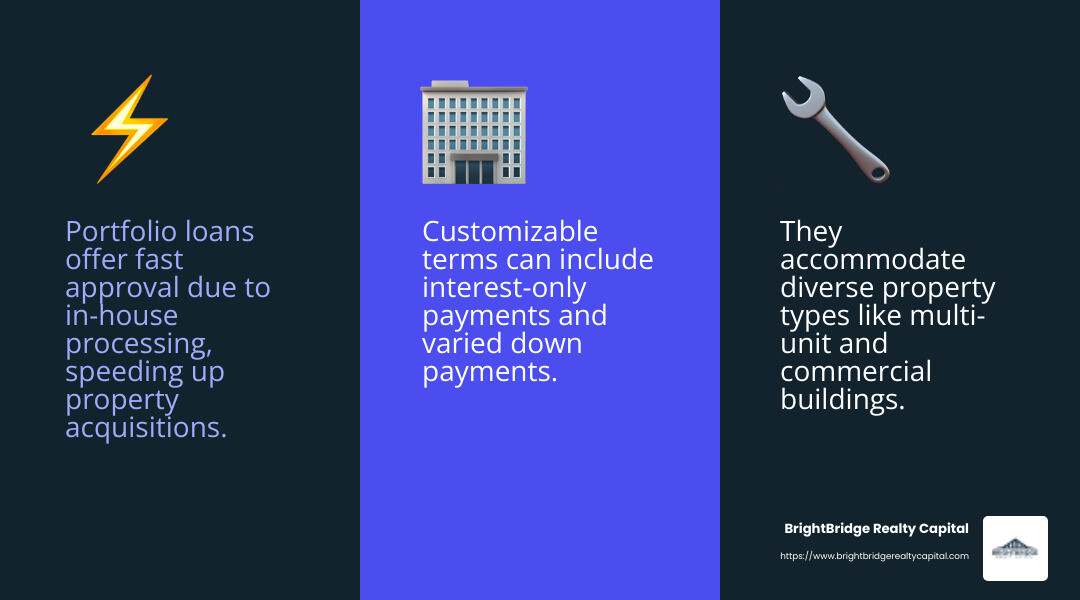Portfolio Loan Requirements: The Key to Your Next Investment

Portfolio loan requirements are crucial for anyone interested in investment properties, as they offer a pathway to flexible financing solutions. Whether you're looking to invest in complex real estate or seeking a custom loan option that regular lenders might not provide, understanding these requirements is your key to open uping opportunities.
- Credit Score: Minimum 600-650.
- DTI Ratio: Flexible acceptance.
- Down Payment: Typically 15% to 30%.
Real estate investing often requires a creative approach, especially with projects like fix-and-flip or expanding rental portfolios. This is where portfolio loans shine, offering you the flexibility to finance properties that may not fit traditional lending criteria. From adjustable terms to faster approvals, these loans can be a strategic tool to maximize your investment potential.

Understanding Portfolio Loans
Portfolio loans are a unique type of mortgage that offer investors a way to finance properties outside the traditional lending box. Unlike conventional loans, these loans are kept in-house by the lender. This means the lender holds onto the loan rather than selling it to external investors. Because of this, portfolio lenders have more freedom to set their own rules and offer customizable terms to borrowers.
Customizable Terms
One of the standout features of portfolio loans is their flexibility. Lenders can tailor the loan terms to fit the borrower's needs. This could mean offering adjustable interest rates or unique down payment options. For example, a borrower might benefit from an interest-only payment plan during the initial years of the loan, which can help manage cash flow more effectively.
In-House Loans
Because these loans are kept in-house, lenders can evaluate applications on a case-by-case basis. They often use a more holistic view of the borrower’s financial situation. This can be a big advantage if your financial profile doesn't fit the standard mold. For instance, if you're self-employed or have a non-traditional income stream, a portfolio loan might be more accessible compared to traditional mortgages.
Non-Traditional Properties
Portfolio loans are especially beneficial for financing non-traditional properties. These could be properties that regular lenders might shy away from, such as non-warrantable condos, mixed-use buildings, or high-value homes. Lenders offering portfolio loans have the flexibility to consider these types of properties, making them a great option for real estate investors looking to diversify their holdings.
In summary, portfolio loans offer a flexible financing option that can be custom to meet the unique needs of borrowers and properties. They provide an alternative for those who may not qualify for traditional loans, opening the door to a broader range of investment opportunities.
Portfolio Loan Requirements
Credit Score and Credit History
When it comes to portfolio loan requirements, credit score and history are crucial but often more flexible than with traditional loans. Most portfolio lenders don't adhere to the rigid credit score standards set by conventional loans. While a minimum credit score is usually required, it can vary widely between lenders. Some may accept scores as low as 580, while others might require at least 640 or even 700. This flexibility allows borrowers with past credit issues, like bankruptcies or foreclosures, to still qualify if they demonstrate strong assets or extensive industry experience.
Debt-to-Income Ratio and Cash Flow
Unlike conventional loans, which often impose strict debt-to-income (DTI) ratios, portfolio loans focus more on cash flow. This means that if your property generates enough income to cover loan payments, your personal DTI might not be as critical. Portfolio lenders often use the debt service coverage ratio (DSCR) instead, which measures the property's income against the debt obligations. This allows real estate investors with multiple income streams, like rental payments or house flipping profits, to qualify more easily.
Down Payment and Loan-to-Value Ratio
Portfolio loans usually require larger down payments, typically around 20-30% of the property's value. This higher equity stake reduces the lender's risk and can lead to more favorable loan terms for the borrower. The loan-to-value (LTV) ratio is also more flexible with portfolio loans. Borrowers who can provide a higher down payment may benefit from better interest rates and terms, making it worthwhile to bring more equity to the table. This flexibility in LTV ratios can be particularly advantageous for investors looking to finance unique or higher-risk properties.
Benefits and Drawbacks of Portfolio Loans
Portfolio loans offer a mix of flexibility and customized terms that can be very attractive to certain borrowers. However, they also come with challenges that need careful consideration.
Pros of Portfolio Loans
Flexibility and Customized Terms
Portfolio loans shine in their ability to offer custom solutions. Lenders can adjust terms to fit the borrower’s unique financial situation. For example, they might offer interest-only payment options or allow for different down payment structures. This customization can make a big difference for borrowers with non-standard financial situations.
Faster Approval Process
Since portfolio loans are held by the lender and not sold in the secondary market, the approval process is often quicker. This can be a significant advantage if you need funds fast to secure a property deal.
Diverse Property Types
One of the standout benefits is the ability to finance a wide range of property types that traditional lenders might shy away from. Whether it's a multi-unit residential building or a commercial property, portfolio loans are more accommodating.
"Portfolio loans can be a game-changer for investors looking to expand into unique property markets," says a real estate expert.

Cons of Portfolio Loans
Higher Costs and Interest Rates
With greater flexibility comes higher costs. Portfolio loans typically have higher interest rates compared to conventional mortgages. This is because lenders take on more risk by holding the loan in-house.
Stricter Criteria
While flexible in some areas, portfolio loans can still have stringent criteria in others. For instance, lenders might demand more comprehensive financial documentation or require higher equity stakes.
Limited Lender Options
Not every financial institution offers portfolio loans. This can limit your options and make it necessary to shop around more to find a lender that fits your needs.
Portfolio loans are a powerful tool for real estate investors but come with trade-offs that need careful evaluation. Next, we'll explore how to qualify for a portfolio loan, focusing on the essential documentation and financial readiness required.
How to Qualify for a Portfolio Loan
Preparing Financial Documents
Getting a portfolio loan starts with gathering the right paperwork. Think of it as building your case to show lenders you’re a good bet.
Key Documents You’ll Need:
Tax Returns: Have at least two years’ worth of tax returns ready, especially if you’re self-employed. This helps lenders see your income history.
Bank Statements: Be prepared with 12-24 months of bank statements. These show your cash flow and financial stability.
Asset Verification: Lenders want to see what you own. This means showing them statements for savings, investments, and any other assets.
Rental Income Documentation: If you’re an investor, provide proof of any rental income. This could be lease agreements or payment histories.
Being organized with these documents can speed up the loan process and improve your chances of approval.
Finding the Right Lender
Not all lenders offer portfolio loans, so it’s crucial to find the right one. Here’s how you can start:
Look Locally:
- Local Financial Institutions: Smaller banks and credit unions often have more flexibility and may offer portfolio loans. They can tailor terms to your specific situation since they aren’t bound by the strict guidelines of larger banks.
Consider Specialized Lenders:
- Specialized Lenders: These are lenders who focus on portfolio loans and understand the needs of real estate investors. They are more likely to offer creative solutions and customized loan terms.
When selecting a lender, compare rates, terms, and their experience with portfolio loans. You want someone who understands your investment strategy and can offer the best terms for your needs.
Finding the right lender and preparing the necessary documents are the first steps in securing a portfolio loan. Next, we'll answer some frequently asked questions about portfolio loan requirements to help you steer this process with confidence.
Frequently Asked Questions about Portfolio Loan Requirements
What is the minimum credit score for a portfolio loan?
Portfolio loans offer more flexibility than conventional loans, but credit score requirements can still vary widely. Some lenders may accept credit scores as low as 580, while others might require a minimum score of 640 or even 700 if you don't have a down payment. It's essential to check with your lender to understand their specific requirements.
Can I refinance a portfolio loan?
Yes, you can refinance a portfolio loan, but there might be some challenges. Portfolio lenders may charge prepayment fees, which can make refinancing more costly. It's crucial to negotiate these fees upfront to ensure a smoother refinancing process. If you're considering refinancing, consult with your lender to explore options that suit your financial situation.
What types of properties are eligible for portfolio loans?
Portfolio loans are ideal for properties that don't fit the conventional mold. Eligible properties can include:
- Non-warrantable condos: These are condos that don't meet the criteria set by Fannie Mae or Freddie Mac.
- Mixed-use buildings: Properties that combine residential and commercial spaces.
- Extremely high-value homes: Luxury homes that exceed the limits for conforming loans.
However, it's important to note that each lender may have its own restrictions. For instance, some may not finance land or manufactured homes. Always verify with your lender to understand their property eligibility guidelines.
Conclusion
At BrightBridge Realty Capital, we understand that every real estate investor has unique needs. That's why we offer customized solutions custom to your specific investment goals. Whether you're looking to expand a rental portfolio or dive into non-traditional properties, our portfolio loans provide the flexibility you need.
One of our standout features is our commitment to fast closings. We know that in real estate, time is of the essence. Our streamlined process ensures that you can secure funding quickly—often within a week—so you don't miss out on valuable investment opportunities.
Our direct lending model eliminates intermediaries, which means you get competitive rates and a seamless experience from start to finish. With our nationwide reach, we're equipped to support your investment journey no matter where you are.
If you're ready to explore how BrightBridge Realty Capital can help you achieve your real estate investment goals, connect with us today. Let's build success together.


